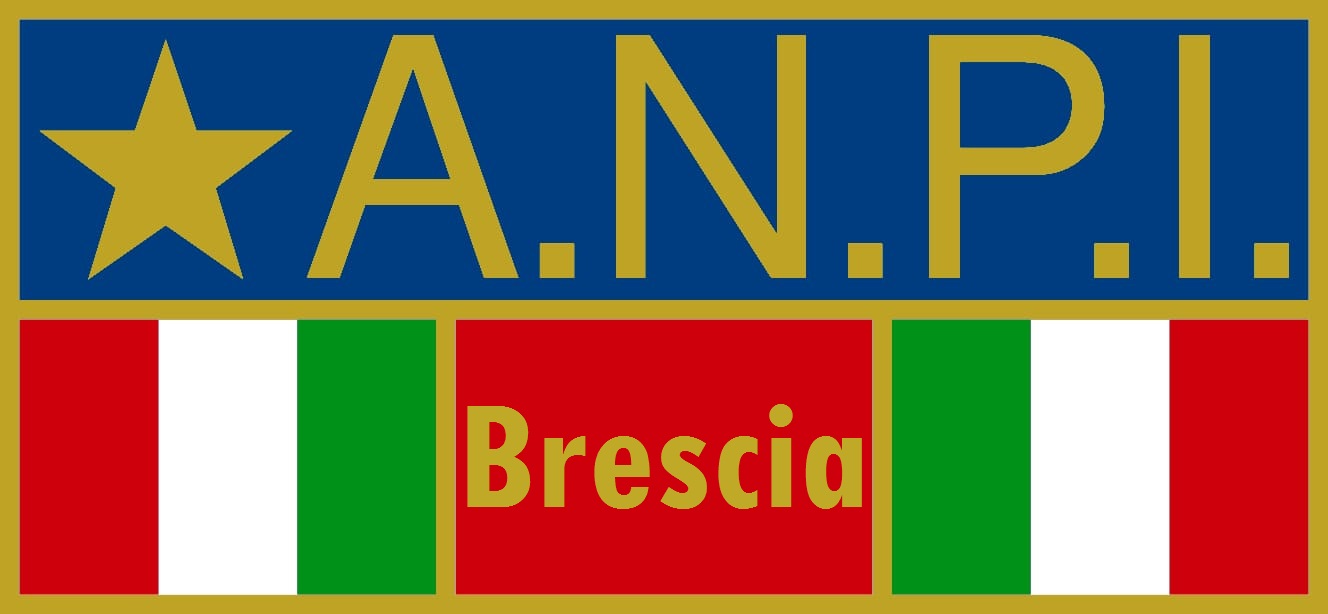On Saturday 29th of November, 2014, the northern Italian town of Brescia will host a conference on the Dublin and Monaghan bombings (17th May 1974,) which will focus on the similarities these coordinated attacks bear with the Piazza della Loggia bombing, 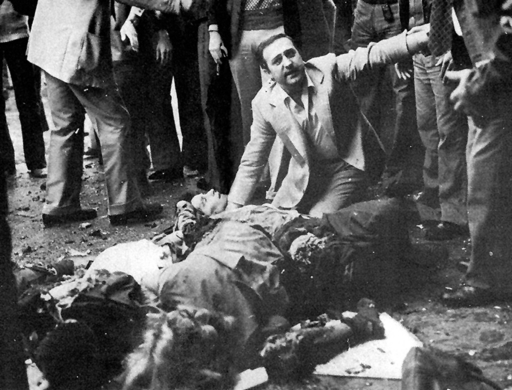 which hit Brescia on the 28th of May 1974.
which hit Brescia on the 28th of May 1974.
The conference is organized by the National Association of Partisans of Italy (Associazione Nazionale Partigiani d’Italia, ANPI) and by the Casa della memoria, the association of the Piazza della Loggia bombing victims’ families.
The Piazza della Loggia bombing was a bomb attack that took place on the morning of the 28th of May 1974, in the heart of Brescia, during an anti-fascist protest. The terrorist attack killed 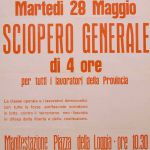 eight people and wounded over 100. The bomb was placed inside a litter bin at the east end of the piazza.
eight people and wounded over 100. The bomb was placed inside a litter bin at the east end of the piazza.
The first judicial investigation led to the condemnation in 1979 of a member of Brescia’s far-right movement. However, this first sentence was cancelled in 1983 and the suspect acquitted in 1985 by the Supreme Court of Cassation.
A second investigation led to the accusation of another far-right activist, who was acquitted in 1989 because of insufficient evidence.
A third investigation is still ongoing. On 19 May 2005, the Court of Cassation confirmed an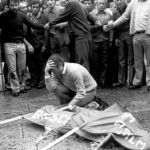 arrest warrant against Delfo Zorzi, a former member of the Ordine Nuovo neo-fascist group, who had previously been tried but acquitted of involvement in the 1969 Piazza Fontana bombing which marked the beginning of the so-called “strategy of tension” in Italy. Carlo Maria Maggi and Maurizio Tramonte, both members of Ordine Nuovo are also suspected of involvement in the Piazza della Loggia bombing. The presence of Tramonte in the place at the time of the blast has been confirmed in 2008 by the results of an anthropological forensic test on a picture taken that day.
arrest warrant against Delfo Zorzi, a former member of the Ordine Nuovo neo-fascist group, who had previously been tried but acquitted of involvement in the 1969 Piazza Fontana bombing which marked the beginning of the so-called “strategy of tension” in Italy. Carlo Maria Maggi and Maurizio Tramonte, both members of Ordine Nuovo are also suspected of involvement in the Piazza della Loggia bombing. The presence of Tramonte in the place at the time of the blast has been confirmed in 2008 by the results of an anthropological forensic test on a picture taken that day.
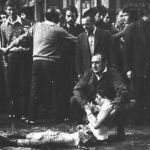 Last May marked the 40th anniversary of the bombings. Starting from the close proximity in time of these massacres (11 days,) and the death in Dublin of an Italian immigrant, Antonio Magliocco, killed by the Parnell Street blast, we reflected on two important issues which tie these two episodes: the involvement of state security forces, and the impunity which has left those who were wounded, the bereaved and their families without truth and justice for 40 years.
Last May marked the 40th anniversary of the bombings. Starting from the close proximity in time of these massacres (11 days,) and the death in Dublin of an Italian immigrant, Antonio Magliocco, killed by the Parnell Street blast, we reflected on two important issues which tie these two episodes: the involvement of state security forces, and the impunity which has left those who were wounded, the bereaved and their families without truth and justice for 40 years.
We will discuss these issues on Saturday 29th of November, with a panel of experts from Italy and Ireland:
SILVIA CALAMATI
Journalist, author, RAINews correspondent in Northern Ireland, Silvia Calamati has been interested in the Irish question since 1982, and has lived in Dublin and Belfast for considerable periods of her time. She has translated One day in my life by Bobby Sands (Un giorno della mia vita, Feltrinelli, 1996), and Renewing the Irish Church by Joseph McVeigh (Guerra e liberazione in Irlanda. La Chiesa del conflitto, Edizioni della Battaglia, 1998). She is the author of Irlanda del Nord. Una colonia in Europa (Edizioni Associate, 2005) (“Northern Ireland. A Colony in Europe”). Her latest book, Neve e fango per dissetarmi. Il diario di Sotiris Kanellopoulos, partigiano della Guerra civile greca (1° marzo – 17 maggio 1949) (Socrates, 2014) is about Greek WW2 partisan Sotiris Kanellopoulos. (More on Silvia Calmati here.)
Church by Joseph McVeigh (Guerra e liberazione in Irlanda. La Chiesa del conflitto, Edizioni della Battaglia, 1998). She is the author of Irlanda del Nord. Una colonia in Europa (Edizioni Associate, 2005) (“Northern Ireland. A Colony in Europe”). Her latest book, Neve e fango per dissetarmi. Il diario di Sotiris Kanellopoulos, partigiano della Guerra civile greca (1° marzo – 17 maggio 1949) (Socrates, 2014) is about Greek WW2 partisan Sotiris Kanellopoulos. (More on Silvia Calmati here.)
MARGARET URWIN
Secretary of Justice for the Forgotten, association campaigning for truth and justice for the victims of the Dublin and Monaghan bombings. Since 2010, JFF has been part of the human rights’ organisation, the Pat Finucane Centre, based in Derry. (More on JFF here.) Margaret Urwin is the author of COUNTER-GANGS: A history of undercover military units in Northern Ireland 1971-1976.
for the victims of the Dublin and Monaghan bombings. Since 2010, JFF has been part of the human rights’ organisation, the Pat Finucane Centre, based in Derry. (More on JFF here.) Margaret Urwin is the author of COUNTER-GANGS: A history of undercover military units in Northern Ireland 1971-1976.
MANLIO MILANI
President of the Casa della memoria, has been campaigning tirelessly in the pursuit of truth and justice for the victims  and relatives of the Piazza della Loggia bombing. Manlio Milani narrowly missed death on May 28th, 1974, but lost his wife Livia Bottardi in the explosion. His committment has been recognized with an important award conferred by the President of the Italian Republic Giorgio Napolitano in April 2013.
and relatives of the Piazza della Loggia bombing. Manlio Milani narrowly missed death on May 28th, 1974, but lost his wife Livia Bottardi in the explosion. His committment has been recognized with an important award conferred by the President of the Italian Republic Giorgio Napolitano in April 2013.
GIULIO GIORELLO
Full Professor of Philosophy of Science at the University of Milan, Giulio Giorello is also  President of SILFS (Italian Society of Logic and Philosophy of Science) and columnist for the Corriere della Sera. He is the author of numerous essays on contemporary epistemological issues. With Marco Mondadori he edited the Italian edition of J.S. Mill’s On liberty, (Il Saggiatore, 1981). With Pietro Adamo, he edited the Italian translation of John Mitchell’s Jail Journal, (Giornale di prigionia, P. Lubrina, 1991). Giorello has been interested for many years in Irish history, culture, society, and politics.
President of SILFS (Italian Society of Logic and Philosophy of Science) and columnist for the Corriere della Sera. He is the author of numerous essays on contemporary epistemological issues. With Marco Mondadori he edited the Italian edition of J.S. Mill’s On liberty, (Il Saggiatore, 1981). With Pietro Adamo, he edited the Italian translation of John Mitchell’s Jail Journal, (Giornale di prigionia, P. Lubrina, 1991). Giorello has been interested for many years in Irish history, culture, society, and politics.
The conference will be introduced by Romano Colombini, President of ANPI Brescia’s ‘school action group’ (Commissione scuola), followed by Giulio Ghidotti, President of ANPI Brescia, and Carlo Gianuzzi, member of the Commissione scuola, who will provide some historical context for the Dublin and Monaghan bombings for the Italian audience.
Interviews:
-
Ermanno Redeghieri, a retired teacher, took part in the dem
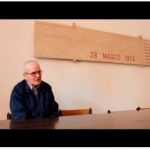 o and was standing yards from the explosion. He saw his colleagues and comrades killed by the blast that spared his life by sheer coincidence only. (In Italian, with English subtitles)
o and was standing yards from the explosion. He saw his colleagues and comrades killed by the blast that spared his life by sheer coincidence only. (In Italian, with English subtitles)
-
Bruna Franceschini, a retired teacher, witnessed the aftermath of the bombing as she left home in a hurr
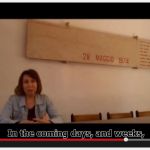 y and went searching for her husband (who survived,) and their colleagues and comrades, some of whom were among the casualties. (In Italian, with English subtitles)
y and went searching for her husband (who survived,) and their colleagues and comrades, some of whom were among the casualties. (In Italian, with English subtitles)
-
Laura Castelletti, Deputy Mayor of Brescia, was only a girl
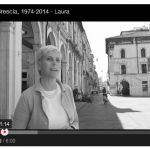 when her father picked her up from school and took her with him to Piazza della Loggia, less than 90 minutes after the explosion. Laura remembers the strong impact this made on her, and reflects on the importance that this massacre had on her life and her political involvement. (In Italian)
when her father picked her up from school and took her with him to Piazza della Loggia, less than 90 minutes after the explosion. Laura remembers the strong impact this made on her, and reflects on the importance that this massacre had on her life and her political involvement. (In Italian) -
Emilio Del Bono, Mayor of Brescia, was also a young boy at
 the time of the bombing. In his interview, he reflects on the impact the Piazza della Loggia bombing had on the city, and the importance to keep alive the memory of what has happened in Brescia on that tragic day. (In Italian)
the time of the bombing. In his interview, he reflects on the impact the Piazza della Loggia bombing had on the city, and the importance to keep alive the memory of what has happened in Brescia on that tragic day. (In Italian)
